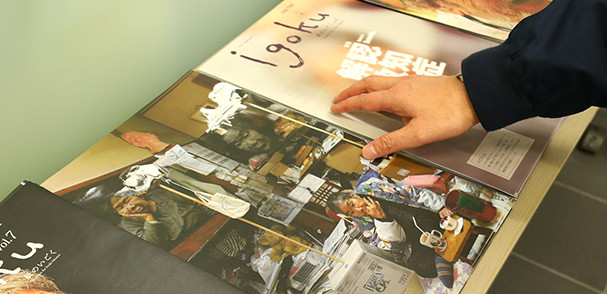Iwaki City Hall
Providing preventive healthcare by applying AI to big data

The health of senior citizens can be changing continually. By keeping in touch with them and sharing information, we can track those changes. Thanks to an AI-based system set up with Fujitsu’s support, Iwaki City Hall has been able to identify high-risk individuals to help anticipate and manage future nursing care levels.
Ryo Igari
Head of Nursing Care Certification, Nursing-Care Insurance Section, Iwaki City Hall
Editor of igoku – the Iwaki Regional Comprehensive Care web-based magazine
Background
Preventive healthcare as the pathway to Japan's future
Low birthrates and an aging population pose significant problems for society. The costs of nursing-care insurance for certified care recipients are continuing to rise, and this places a heavy burden on regional local governments. Preventive healthcare is key to optimizing this burden.
Initiatives are being rolled out nationwide to extend the healthy lifespans of elderly people as much as possible by promoting community participation, providing them with nutritious meals and encouraging them to exercise. Iwaki City has been actively involved in promoting regional healthcare.
However, problems are not uncommon, as indicated by Ryo Igari, Head of Nursing Care Certification, Nursing-Care Insurance Section at Iwaki City Hall, which promotes comprehensive regional healthcare. "City Hall uses an opt-in approach. This means that the administration is only aware of the need for care if an application is submitted. Among the many elderly people not certified as care recipients now, we need to identify high-risk individuals whose nursing care levels are likely to deteriorate rapidly in the future, and who might therefore benefit from preventive healthcare. Then we need to approach and engage them at an early stage."
Social welfare workers conduct programs to look after the elderly, but their time and availability is limited, and they cannot be in touch with all residents. There are more than 50,000 Iwaki City residents in just the ‘very elderly’ category. Obviously, there is a clear need to find a way of efficiently identifying high-risk individuals.
The story so far
An efficient approach using data
Ryo Igari first thought of using nursing-care insurance system data back in 2017. However, realizing that it would be difficult to identify high-risk patients from that data alone, he then considered using other data held by City Hall, such as resident information, certified care recipient information, disability information and specific diagnostic results. To do this, he needed to overcome the barriers between departments.
According to Ryo Igari, "It was no simple task to achieve this. We spent nine months discussing how to avoid inappropriate data use before getting the go-ahead. But ultimately we were able to access all the data for around 97,000 senior citizens and their family members who live under the same roof."
Ryo Igari approached Fujitsu, the developers of Iwaki City’s nursing-care insurance system and started to identify the people targeted for preventive nursing care. In 2018, the first step was to compile a sample list of 298 high-risk individuals. This list was created by City Hall employees who used their accumulated experience and some assumptions relating to age, annual income and whether candidates had a disability of any kind. Staff then visited each of the listed citizens and conducted interviews. The interview results confirmed that just over 80% of the interviewees needed support of some kind.
Work then started using AI in 2019. The AI was taught with the outcomes from the 2018 sample, in terms of the types of conditions that applied to people who progressed to be certified as care recipients in a short period of time. As a result, the AI was able to identify 230 high-risk individuals, with their circumstances confirmed by physical visits.
Outcome and next step
Expanding this initiative to bring about nationwide change
The physical condition of senior citizens is always subject to change. It is important to have a mechanism to keep in touch with them, as the appropriate approaches and support can reduce the subsequent need for nursing care. Providing guidance and support before people reach a critical stage can also enable them to recover their health.
"However, in practical terms, making contact with everyone is very difficult given the limits on our time and on staff numbers. This is why we needed a system to filter and highlight the high-risk individuals," says Ryo Igari. He would like to see the social and economic benefits expand more broadly through the current initiative.
His next development target is using IT to make the work more efficient. Staff who visit high-risk individuals register the results of their visit in the system once they return to City Hall. If they were able to enter their findings during the visit, using handheld devices such as tablet PCs, the time taken to enter the data could be included within the actual visit time.
"The field of social welfare concerns the elderly and many other people. Even slight efficiency improvements can have a major impact. If we can increase the number of local government departments adopting similar ideas, then I think we can look forward to a bright future for Japan," concludes Ryo Igari.
Iwaki City Hall
| Country | Japan |
|---|---|
| Industry | Public Sector |
| Website | http://www.city.iwaki.lg.jp/ (Japanese) |
[Published in 2020]
